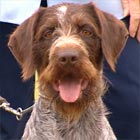Breed: German Wirehaired Pointer
Temperament: loyal, protective and active
Lifespan: 10-12 years
Maintenance: medium
Recommended for: active, independent owners and hunters
If you love the outdoors and you are looking for an active dog with a bit of spirit and character, then a German Wirehaired Pointer might be worth considering.
History
The modern German Wirehaired Pointer (GWP) was developed in Germany in the early 1900s as a result of a desire to produce an all-round hunting dog, able to work on land and in water as a flusher, pointer and retriever.
Until the 1800s, German Pointers were said to be heavy and slow. Breeders say a combination of French Griffon, Pudelpointer, Shorthaired Pointer and Brokencoated Pointer contributed to create the German Wirehaired Pointer breed we see today – a medium-large, but lean and well-muscled dog.
These hunting dogs will instinctively ‘point’ (ie strike a rigid pose), indicating to its handler where game may lay. The hunter will then command the dog to ‘flush’ the game (ie scare the game into the hunter’s view) and then retrieve, intact, any game which the hunter may have shot. It is able to do this on land or water.
The first German Wirehaired Pointer arrived in Australia in 1976.
Temperament
The German Wirehaired Pointer is different in both appearance and temperament to its short-haired cousin. The GWP is more aloof towards strangers and protective in temperament. Breeders say the GWP mixes well with its family, including children, but may be less tolerant of outside children. These pointers can still retain a very strong prey drive and may be inclined to chase the family cat or small animal whilst out for walks.
Breeders recommend that prospective owners must examine the parents before purchasing a pup. Some dogs have been known to be aggressive, though it is claimed that responsible breeders have identified troublesome lines and discontinued their breeding. Prospective owners must be satisfied that the parents have stable temperaments.
The breed is intelligent but early training is essential. The breed is quite headstrong, and without training may otherwise become a handful through later life. The breed can be late to mature and requires sufficient exercise to burn off the excess energy. Bored dogs left in the backyard with no exercise may turn destructive.
Appearance
A noble appearance with an expressive, often determined-looking face, the GWP is a double-coated breed, the harsh outer coat developed in order to protect the skin from thick brush and scrub. The ‘wirey’ hair completely covers the dog, with a ‘beard’ apparent below the jaw. The dense undercoat becomes more prevalent in winter.
Larger than the Shorthaired Pointer, the breed stands at its tallest at 61-68cm, slightly taller than a Golden Retriever. Colours come in predominantly black or brown, interspersed with white (known as roan) or predominantly white with black or brown roan. Although the tail is often docked, the breed standard does not require it to be so.
Feeding
Active dogs such as these have a hearty appetite and are ‘good doers’. Feed a balanced diet of dry food, fresh meat and raw bones.
Health and lifespan
In recent times hip dysplasia has been known to afflict the breed. Some breeders test their breeding stock, some don’t. Prospective owners really should check that the parents have been tested and cleared. The more people ask for these tests, the more likely it is that breeders will ensure that their dogs are cleared of genetic related conditions. Entropion (turned-in eyelids) does occur, albeit infrequently in Australian dogs. Average lifespan of around 12 years.
Space and exercise
The breed needs regular exercise. Without it, the dog can become very mischievous, digging holes, barking and being generally destructive.
Maintenance and cost
Most individuals will have a stable coat; one that requires little maintenance. Others may not and will require regular grooming. These dogs will possess a longer, woolly coat which will attract burrs and foreign matter. The undercoat will shed (usually in the spring, though this can be variable), at which time it requires brushing. The harsh, stable coat will only need occasional combing out of dead hair. Exhibition dogs may have their coats ‘stripped’, i.e loose, dead, hair pulled out. Clipping is not required. The proper coat should not become overly long or woolly.
Average prices range from $500 – $1000 for a pup.
Ideal owner
Not for everyone, the GWP is ideally suited those who are experienced dog owners, particularly suited to active people, hunters or those looking for a watch dog. The breed demands obedience training, though is intelligent and responsive to positive but firm training practices. The breed may be too active for families with young children, with the ability to knock down a child. Families with older children must be aware of the breed’s temperament and should only introduce a suitable puppy into the family, rather than an older dog.Families looking for a pointer should consider whether they prefer the quieter shorthaired breed or the more protective wirehaired type.
National contacts
To find up-to-date contacts for breeders, contact the following organisations.
The Australian National Kennel Council (ANKC)
www.ankc.org.au
Dogs NSW
http://www.dogsnsw.org.au/breeders-directory
Email: [email protected]
Phone: 1300 728 022 (NSW only) or (02) 9834 3022
Fax: (02) 9834 3872
Dogs Victoria
http://www.vca.org.au
Email: [email protected]
Phone: (03) 9788 2500
Fax: (03) 9788 2599
Dogs ACT
http://www.actca.asn.au
Email: [email protected]
Phone: (02) 6241 4404 – Fax: (02) 6241 1129.
Dogs West
http://www.cawa.asn.au
Email: [email protected]
Phone: (08) 9455 1188
Fax: (08) 9455 1190
Dogs SA
http://dogssa.com.au
Phone: (08) 8349 4797
Canine Control Council of Queensland
http://www.cccq.org.au
Email: [email protected]
Phone: (07) 3252 2661
Fax: (07) 3252 3864
Tasmanian Canine Association
http://www.tasdogs.com
Email: [email protected]
Phone: (03) 6272 9443
Fax: (03) 6273 0844
Dogs NT
http://www.territorydogworld.com
Email: [email protected]
Phone: (08) 8984 3570
Fax: (08) 8984 3409
The Australian National Kennel Council (ANKC)
www.ankc.org.au



